The Evolution of the Automotive Industry Chain Is in Focus of Outing 100 Media
Author: Zheng Wen
“We are not willing to be a team that focuses on the atmosphere of technological innovation, but we are willing to be a team that focuses on practical combat. We are willing to endure loneliness and see the vast universe.” This declaration by Li Yanhong has a bit of a chivalrous spirit.
It also fits quite well with the title of this article. Will Baidu lead to a greater era, as Li Yanhong hopes?
On August 18, at the press conference of the live broadcast “Baidu World Conference 2021” jointly held by Baidu and CCTV, Baidu’s chairman and CEO Li Yanhong, starting with an automotive robot, gradually revealed how Baidu, which missed the era, will work hard to pick up the future.
Overall, this automotive robot subverts the traditional design concept of cars: on the exterior, automatic gull-wing doors, fully glass roof, and external sensors are integrated, with an extremely futuristic sense of technology; On the interior, there is no need for a steering wheel or pedals, and it has intelligent configuration such as an extra-large curved screen, an intelligent control panel, variable light glass, zero-gravity seats, etc.
Compared with Tesla’s design concept for its current vehicles, Baidu’s automotive robot is more advanced, or it can be said to be “ahead of the current generation of Tesla.” However, compared with Zoox’s concept car, a subsidiary of Amazon, it is quite similar in terms of space and design sense.
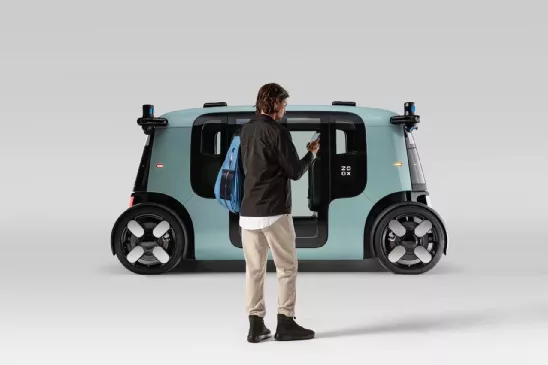
Since there is no need for a driver’s seat, the self-driving rental car launched by Zoox, like Baidu’s automotive robot, has a single-box style without a steering wheel, and the internal space is more spacious and comfortable than traditional cars.
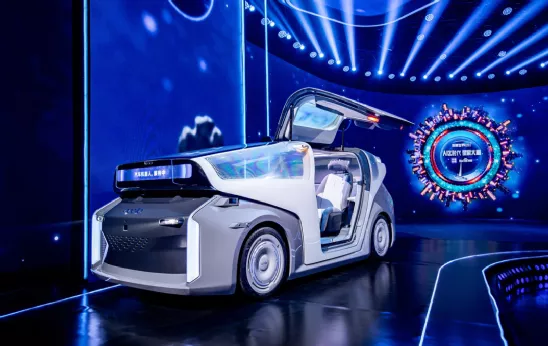
At the Anaia sub-venue of the Baidu World Conference, artist Jin Chen and CCTV host Wang Jia Ning, as Baidu’s AI experience officers, experienced the automotive robot for the first time. During the journey, the automotive robot was fully self-driving and smoothly handled complex scenes such as unprotected left turns, pedestrians and other vehicles, making the experience officers feel very stable and safe.
The kernel of this automotive robot also subverts the traditional design concept of cars. It not only achieves L5-level self-driving to free people’s hands and feet, but it can also communicate with people, obey commands, and actively provide services. Based on Baidu Brain’s AI capabilities, it also has the ability of self-learning and continuous upgrading.
When changing the destination temporarily, the automotive robot can even make corresponding itinerary modifications, and Jin Chen exclaimed, “It’s too considerate, I really want to have one.”
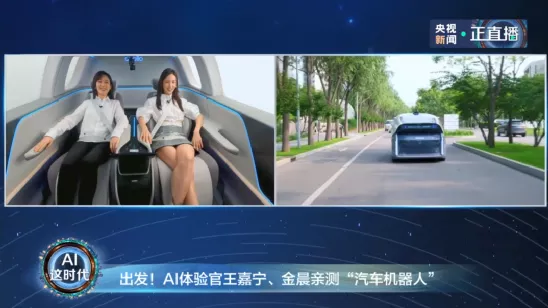 # Li Yanhong said in a livestream: “We believe that in the future, cars will become ‘car robots’, and the form of a ‘robot’ in the future will be very similar to that of a car. Car robots have these characteristics: autonomous driving, intelligent assistant, loyal companion, and self-learning.”
# Li Yanhong said in a livestream: “We believe that in the future, cars will become ‘car robots’, and the form of a ‘robot’ in the future will be very similar to that of a car. Car robots have these characteristics: autonomous driving, intelligent assistant, loyal companion, and self-learning.”
In the same era, different car products have such a strong sense of detachment. Interesting, isn’t it?
The Era of AI
At this year’s Baidu World Conference, Li Yanhong, who had previously focused on technical discussions, made a great effort to tell the public about the application of AI in various industries, which can be said to be doing “popular science”.
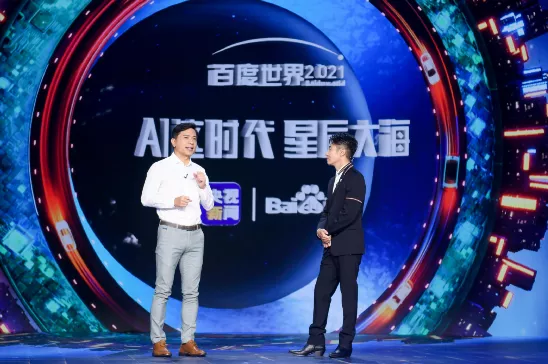
All of these can be summarized in one sentence: AI will become the biggest dividend of the next era. Li Yanhong hopes that Baidu will light up this tree of technology.
Baidu CTO Wang Haifeng pointed out: “Currently, the new generation of information technology, represented by AI, is thriving, driving the new generation of technological revolution and industrial transformation. In the new stage of development, AI technology is becoming more and more complex, and integrated innovation is becoming a new norm. At the same time, as AI technology penetrates into various industries and faces different application scenarios, reducing thresholds has become increasingly important.”
Based on this, Baidu World Conference 2021 released Baidu Brain 7.0. The two most significant features are: integrated innovation makes the ability of AI stronger; reduced thresholds make it easier to develop AI applications.
“The era of AI, the universe and the ocean.” Although the theme of this conference is grand, it is also concrete. Baidu presents its thinking and layout for the application of AI in various industries from the perspectives of AI travel, AI life, AI industry, and independent technological innovation.
Take AI travel as an example, and we can see Baidu’s core judgment and expectations for its future business growth.
Today, the competition in the second half of autonomous driving has begun, and large-scale commercial operations will become the focus of industry development. As Li Zhenyu, senior vice president of Baidu Group and general manager of the Intelligent Driving Business Group, said: “Autonomous driving capability has become the decisive high ground for intelligent cars.”
On the day of the conference, Baidu Apollo brought a newly upgraded unmanned vehicle travel service platform: Carrot Run.

Combined with Apollo’s two-year operation practice, Carrot Run can provide the public with commercial operations and diversified value-added services, accelerating the arrival of the era of unmanned travel for everyone. Through Carrot Run, users can call Baidu Apollo unmanned vehicles, which have the embryonic form of car robots.### Apollo Autonomous Driving Service of Baidu Has Served Over 400,000 Passengers and Tested More Than 14 Million Kilometers
As of the first half of 2021, Baidu Apollo Autonomous Driving Service has served over 400,000 passengers and tested more than 14 million kilometers. The number of patents related to autonomous driving has exceeded 2,900. The service is available in four cities, including Beijing, Guangzhou, Changsha, and Cangzhou, with plans to expand to more cities and transportation scenarios in the future.
These solid foundations have provided Baidu with a solid foundation and confidence as it begins the next stage of large-scale commercial operations.
Losing an Era and Gaining a Greater One?
For a long time, the view that “Baidu has missed an era” was prevalent.
In 2011, WeChat and Momo were launched, Alipay received its mobile payment license, the iPhone 4 was a hot seller, and Android overpowered Symbian system. Against this backdrop, the prosperity of mobile internet and Baidu’s old-fashioned image formed a sharp contrast. The search engine that was once able to index all public information on the internet lost its entry position and pricing power in the era of isolated apps.

Since then, people have witnessed the emergence of shared bicycles, placed orders for takeout on their smartphones, played mobile games, and indulged in short videos and live streaming. In just a few years, almost every industry has been reorganized, while Baidu seems to have been completely silent during this period.
By the first half of 2019, Baidu’s total market capitalization was around US$41 billion, while Alibaba’s was around US$438 billion, and Tencent’s was about US$429 billion. Baidu’s market value was only one-tenth of that of Tencent and Alibaba.
Time and tide wait for no one, and Baidu’s competitors are full of vigor. For those who care about the development of China’s technology industry, they have to understand how this enterprise, which was once judged to have “lost a whole era,” has obtained a ticket to the next era.
There are always signs that are overlooked.
In fact, as early as the peak of the PC internet in 2010, Baidu had already started to use machine learning to readjust its search algorithm and conducted research and development on natural language processing, machine translation, data mining, and other technologies.
The application form of the search engine is indeed the most likely to generate demand for the combination with artificial intelligence. The problems encountered by search engines and the technical accumulation caused by them are very suitable for the development of artificial intelligence later.
Therefore, Robin Li saw the value of artificial intelligence earlier than others. “In Baidu’s practice, we captured some clues and saw that the combination of new computing architecture and artificial intelligence software would burst out huge power five or six years earlier than others.”
In Li’s speech at the most influential overseas student association in Silicon Valley in 2012, the Huayuan Technology Association, some ideas of the development of artificial intelligence can be seen.
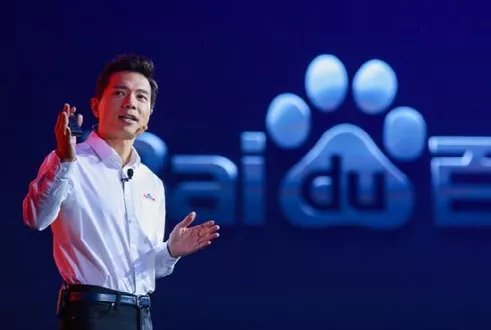
“Due to the large scale of Chinese internet companies and internet market, Chinese users may encounter certain specific challenges and difficulties before American consumers, and the Chinese internet industry can solve these problems through innovation. The development of the Chinese internet will break away from the imitation model and generate more localized inventions and innovations.”
At the Two Sessions in 2015, Robin Li was the first to propose the establishment of the “Chinese Brain” project, aiming to promote the cross-development of artificial intelligence and seize the commanding heights of the new round of technological revolution.
Sometimes, a groundbreaking product may not quickly realize its immense commercial value. At this crucial moment of decision, the strategic vision of leaders becomes crucial.
Robin Li firmly believed that the Internet was just an appetizer, and artificial intelligence was the main course. The changes they made in this society were fundamentally different in quantity. The Internet only made the existing methods more effective, while AI could turn the impossible into possible.

Baidu’s degree of emphasis on AI is directly reflected in real investment.
In a public speech in 2017, Robin Li pointed out, “In the top 500 companies in China, we are definitely not the first in terms of income, but we are definitely first in terms of the proportion of R&D spending to income. And this R&D investment is mostly dedicated to AI.” According to statistics, since entering the field of artificial intelligence in 2010, Baidu’s revenue growth has increased by 14 times, while R&D expenses have increased by more than 25 times.
Ma Huateng also admires Robin Li’s progress, stating, “Robin is ahead of us in artificial intelligence, and we are still far behind in comparison.”
In the past, Baidu has always relied on online advertising revenue, which not only resulted in low market value in the secondary market but also affected corporate image. Now, Baidu has finally obtained a ticket to the next era, showing Robin Li’s determination to break away from the single online advertising profit model and embrace the path of AI technology.
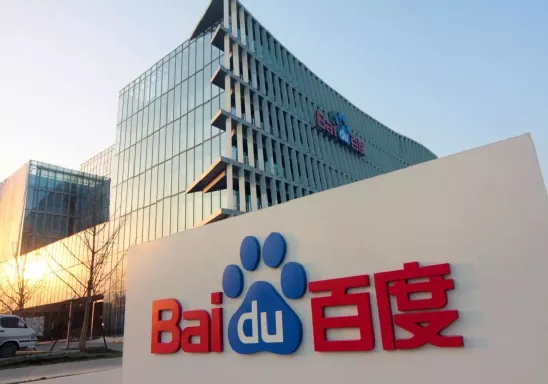
During the Q1 earnings conference call, Robin Li stated that “AI and cloud will account for more than half of Baidu’s revenue in the next three years.”The just-released Q2 2021 financial report of Baidu shows that the advertising business accounts for 60% of the entire revenue, while the revenue of innovative businesses (cloud computing, AI, autonomous driving, and Xiaodu smart home hardware) accounts for only 16%. However, the non-online marketing revenue in Q1 and Q2 increased by 70% and 80%, respectively, compared with the same period last year.
Nowadays, Baidu is “enduring loneliness in the vastness of the universe”. The next step depends on what kind of “stars and seas” AI can win for it.
This article is a translation by ChatGPT of a Chinese report from 42HOW. If you have any questions about it, please email bd@42how.com.